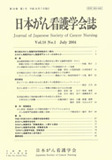Japanese
English
- 販売していません
- Abstract 文献概要
- 参考文献 Reference
要旨
本研究の目的は,化学療法を初めて受ける肺がん患者の治療前・治療中のコーピングを明らかにすることである.方法は,化学療法を初めて受けることが予定されている20歳以上の肺がん患者9名を対象に面接・参加観察を行った.その結果,治療前は『化学療法の情報を得る』『化学療法の情報を吟味する』『身体をよい状態に保つ』など6つの問題中心型と『気分転換を図る』『化学療法から逃避する』『楽観的な見通しを持つ』など5つの情動中心型コーピングが用いられていた.治療中は『抗がん剤の副作用に取り組む』『身体をよい状態に保つ』『家族の疲労・気持ちに配慮する』など8つの問題中心型と『気分転換を図る』『化学療法から逃避する』『副作用の発現をあきらめる』など5つの情動中心型コーピングが用いられていた.両時期を比較すると『化学療法の情報を吟味する』『楽観的な見通しを持つ』は治療前のみに,『点滴がうまくいくように対応する』『家族の疲労・気持ちに配慮する』『病室環境を調整する』『副作用の発現をあきらめる』は治療中のみに用いられていた.
以上から治療を継続するためには,治療前は,患者に必要な情報を提供する,患者が治療を受けるという現実の問題に取り組み,積極的な姿勢を持つための支援,治療中は家族を含めた援助,化学療法の副作用対策などの看護介入が必要であることが示唆された.
The purpose of this study was to identify valid means of coping with the stress of patients before and during first chemotherapy for lung cancer. Nine patients with lung cancer, who were 20 years old or over and were scheduled to receive chemotherapy for the first time, were interviewed and observed. The stress-coping means used before treatment were six problem-focused methods(e.g., "obtaining information on chemotherapy", "reviewing information on chemotherapy" and "keeping a good physical condition")and five emotion-focused methods(e.g., "diverting oneself", "escaping from chemotherapy" and "remaining optimistic"). During treatment, eight problemfocused methods(e.g. ,"dealing with adverse reactions to anti-cancer agents", "keeping a good physical condition" and "paying attention to the fatigue and feelings of family members")and five emotion-focused methods(e.g. ,"diverting oneself", "escaping from chemotherapy" and "accepting adverse reactions") were used. When the stress-coping methods used before treatment were compared with those used during treatment, it was found that the methods "reviewing information on chemotherapy" and "remaining optimistic" were only used before treatment, while the methods "receiving drip infusion of anti-cancer agents", "paying attention to the fatigue and feelings of family members", "adjusting the ward environments" and "accepting adverse reactions" were used only during treatment.
These results suggest that nursing interventions required to encourage the patient to continue receiving treatment include :(1)supplying appropriate information to the patient before and during treatment,(2)dealing with the anxiety of the patient to help him/her become willing to receive treatment, (3)providing support to the patient and his/her family and(4)dealing with adverse reactions to chemotherapy.
Copyright © 2004, Japanese Society of Cancer Nursing All rights reserved.


